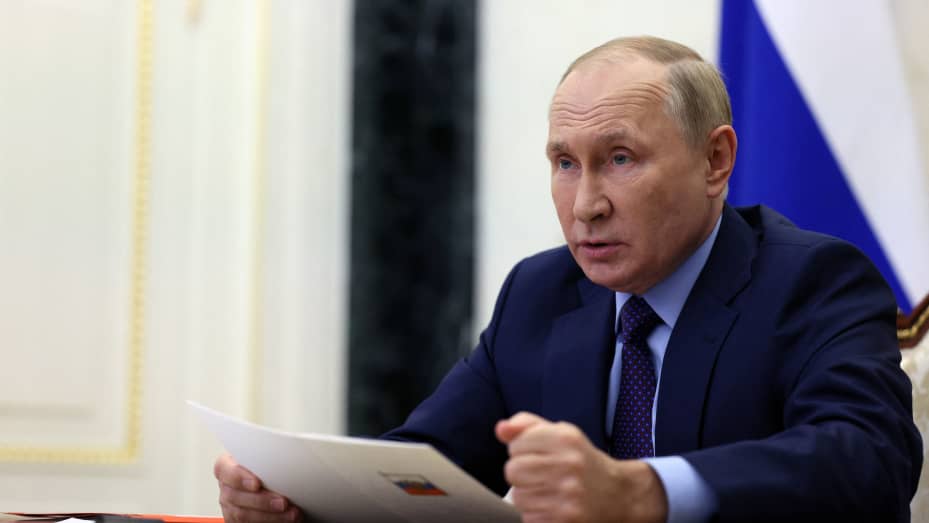
The world is entering the moment of maximum danger and at the same time of maximum opportunity in the war between Russia and Ukraine.
The moment of maximum danger is when Putin is failing in the pursuit of his delusional obsession, which led to his invasion of Ukraine.
As Ukrainian courage and resilience transform his arrogance into humiliation, the danger is rising that he could turn to weapons of mass destruction, including the use of tactical nuclear weapons, to coerce Ukraine and confound its allies at a time when Putin's influence is waning.
This is the first time since Putin launched his war that world leaders will have a chance to speak at the UN. It is a chance for the U.S. President, along with his European and Asian allies, to talk about the dangers of Putin's war to any country that cares about national sovereignty, to condemn Putin's war atrocities, and to sway those remaining fence-sitters.
The UN has wrestled with the technicality of whether Ukrainian President Volodymyr Zelenskyy should be allowed to speak via video link to this most significant gathering of world. The UN general assembly members voted to give the Ukrainians their stage.
Russia, a member of the UN Security Council, had been trying to stop the speech. Zelenskyy told the Security Council that it should act for peace immediately or it would be in trouble.
He warned that the right of veto in the UN Security Council could be turned into a right to kill. Zelenskyy said that if the UN failed to stop Putin, it wouldn't be international law, but the law of the jungle.
There has been some speculation that the chance that Putin will use tactical nukes against Ukraine, or order some other escalatory action involving chemical or biological agents, has grown due to the Russian leader's increasing military setbacks on the ground.
Scenes of Russian soldiers fleeing the battlefield on bicycles and abandoning their uniforms to disguise themselves as locals were part of a mosaic of failure.
The implosion of Putin's military in the south and east of Ukraine, where Ukrainian troops have retaken at least 2,320 square miles of territory, has given new life to the idea that Putin may have no way out of a losing war.
A leader with a claim to leadership that has focused on his personal masculinity and political invulnerability is at risk of losing it.
That, in turn, seems to be prompting a rethink among both the handful of his allies and a larger group of countries. Modi told Putin that the current era is not an era of war and that he spoke to him about it.
Putin had a meeting this week with the Chinese president. Before the Beijing Olympics and before Putin launched his war, Putin may have seen the limits of his relationship with him. Putin told Xi that they understood his concerns about the war.
For autocrats, personal survival is their top priority. Now is the time for Putin to think about that. It's not clear what would make sure of it. It is possible to use weapons of mass destruction and nuclear weapons.
The world needs to be ready for this contingency, even though the risk to Putin is huge. Pre-empting him would be the best way to do that because the world knows his plan.
Rose Gottemoeller, a former deputy secretary general of NATO, fears that Russia will use weapons of mass destruction in a reprisal attack.
The purpose of such weapons is to get the Ukrainians to capitulate and not to reach Washington or Berlin.
Matthew Kroenig tried to answer the question of how to deter Russian nuclear use in Ukranian in a memo to the president.
It could advance the Kremlin's military aims, undermine U.S. interests around the world, and cause a humanitarian catastrophe unseen since 1945. The United States should issue public, deliberately vague threats of serious consequences for any Russian use of nuclear weapons and be prepared to follow through with military strikes on Russian forces if deterrence fails.
It is essential that the United States convey this message privately at senior levels and accompany it with the movement of relevant conventional forces into the area in a way that shows the seriousness of the U.S.
One hopes world leaders use the opportunity to fully listen to Zelenskyy.
The UN has implications for the international community that are wide-reaching.
There are many dangers in the weeks to come. The increasing erosion of Putin's international standing provides an opportunity to do the right thing: accelerate and step up all efforts to ensure Putin's defeat.
If not right now.
Frederick Kempe is the CEO of the Atlantic Council.